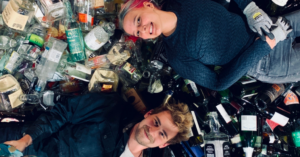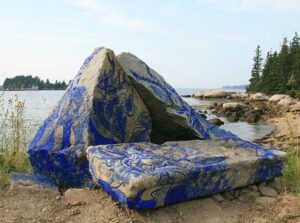Despite being conscious of the current global climate crisis, many people today feel they lack the knowledge, solutions, time, or energy to implement major environmental change. But they may be more powerful than they think– they truly do have the power to make small-scale change in the world, if they get creative. Small groups like Glass Half Full and Swahili Modern, as well as individuals like Aviva Rahmani, use their normal daily actions and hobbies to their advantage in order to create healthy and sustainable change.
Glass Half Full Nola was founded in 2020 by Franziska Trautmann and Max Steitz, two Tulane students who wanted to build stronger infrastructure for glass recycling in New Orleans. According to the EPA, the United States produced 12.3 million tons of glass in 2018, and 7.6 million tons of glass entered landfills. Only 3.1 million tons of glass were recycled that year (EPA). In light of this issue, Trautmann and Steitz used the resources they already had and started their project in their backyard. They hand-crushed the glass that they and their friends used in their day-to-day lives. As their community learned of their project and sent in more donations, their project expanded to a small business operating out of a glass processing facility. The company established drop-off sites and collection services all over New Orleans to increase accessibility for their new method of environmental stewardship. The donated glass gets crushed into sand and gravel for coastline restoration, disaster relief, flooring, and new glass products. With just an idea, a backyard, and some everyday tools, Trautmann and Steitz made a positive environmental impact. Though their initial plan grew into a more ambitious project, the humble beginnings of Glass Half Full Nola prove that anyone can use what they have to make meaningful small-scale change for the Earth.

Students in New Orleans aren’t the only ones putting their trash to good use: Swahili Modern, a fair trade company based in Portland, Oregon, distributes artisanal, handmade, African products to consumers in the United States. The business which now consists of twenty employees began with only its founder, Leslie Mittelberg. Mittelberg aimed to supply African artisans with more options for work, to give struggling artisans a stable and steady income, and to empower female artisans working from home. Swahili Modern currently distributes recycled art, and the pieces’ descriptions inform consumers of who made them and how. For example, the lion sculpture shown above was built from upcycled flip-flops. The sculptors, who work for a company called Ocean Sole, are based in a workshop in Nairobi, Kenya, and they make a living by collecting the several tons of flip-flops that wash up on the Kenyan coast each year. By working with this company, and many others, Mittelberg’s network of small businesses prove that it is possible to incorporate environmentally conscious products into a company’s regular inventory– something every small business is capable of doing.


While artists in Africa create dazzling forms from discarded flip-flops, the artist Aviva Rahmani makes local change from right here in Maine. In her art, she embraces the idea of intersecting art and environmentalism. In 2002, Rahmani started the Blue Rocks Project to spread awareness about an obstructed causeway on Pleasant River in Vinalhaven, a town on an island in Maine. The Army Corps of Engineers had just finished construction on the causeway, leaving it narrower than before, and the construction prevented tidal flow between the saltwater and freshwater. Wetlands are vital to the health of the environment, and according to the World Wildlife Fund, the world lost about 35 percent of wetlands between 1970 and 2015 (WWF). Aviva Rahmani painted forty boulders around the causeway with complex blue designs using non toxic paint to draw attention to this serious issue. When the town subpoenaed her to wash off the rocks, she staged a “wash-in” to educate people in passing cars about the importance of maintaining healthy estuaries as she washed. The attention she brought to estuarine health helped convince the USDA to commit $500,000 to restoring twenty-six acres of vital wetlands. Rahmani wanted to make change, so she used what she had and what she knew to spread awareness for important causes. While not everyone can procure thousands of dollars from the USDA, Rahmani’s willingness to incorporate parts of her daily life into the world of environmental activism proves that anyone else can do the same.

All of these individuals and small companies making environmental change began as the rest of us are now– just people with an idea and a rudimentary set of tools to implement their plan: hammers and large containers of glass in someone’s backyard; old pieces of footwear and tools from the workshop; a bucket of paint and a rock. These simple beginnings prove to the world that anyone who wants to can make a difference in the environment. Anyone at all. On your daily walk, pick up the trash you see along the way. See how creative you can get with the soda bottles you throw away– maybe they’d make a cool plant pot. No matter what it is, the next time you have an idea that could help save the environment but don’t know where to start, just look to what you know.
Learn more about Glass Half Full Nola here.
Learn more about Swahili Modern’s recycled art here.
Learn more about Aviva Rahmani’s work here.
Works Cited
Facts and Figures about Materials, Waste, and Recycling– Glass: Material-Specific Data. EPA. Retrieved December 3, 2023, from https://www.epa.gov/facts-and-figures-about-materials-waste-and-recycling/glass-material-specific-data.
Glass Half Full Nola— Glass recycling, coastal restoration. Glass Half Full. Retrieved October 15, 2023, from https://glasshalffull.co/.
Kiri Technologies. (n.d.). Founders: Franziska Trautmann and Max Steitz. Kiri News. Retrieved October 15, 2023, from https://kiri.news/from-waste-to-resource-the-innovative-story-of-glass-half-full-nola/.
Our Impact. Ocean Sole. Retrieved December 3, 2023, from https://oceansole.com/pages/our-impact.
Rahmani, A. (n.d.). Blue Sea Lavender detail on Echoes of the Islands. Aviva Rahmani. Retrieved November 10, 2023, from https://www.avivarahmani.com/endangered-species-ecoart.
Recycled Handcrafted Sculptures from Kenya. Swahili Modern. Retrieved October 15, 2023, from https://www.swahilimodern.com/collections/recycled-art.
Swahili Modern. (n.d.). Extra Large Flip Flop Lion Sculpture. Swahili Modern. Retrieved October 15, 2023, from https://www.swahilimodern.com/collections/recycled-art/products/extra-large-flip-flop-lion-sculpture-1.
Swahili Modern. (n.d.). Kenyan artisans that build sculptures from recycled materials. Swahili Modern. Retrieved October 15, 2023, from https://www.swahilimodern.com/collections/recycled-art/products/extra-large-flip-flop-lion-sculpture-1.
Water Ecosystems Preservation — Aviva Rahmani. Aviva Rahmani. Retrieved November 10, 2023, from https://www.avivarahmani.com/water-ecosystem-preservation-ecoart.
WWF. World’s wetlands disappearing three times faster than forests: Global Wetlands Outlook paints alarming picture of decline in world’s most valuable ecosystems. World Wildlife Fund. Retrieved December 3, 2023 from https://wwf.panda.org/wwf_news/?335575/Worlds-wetlands-disappearing-three-times-faster-than-forests.
